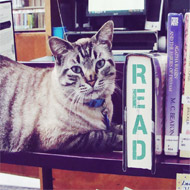
Thousands flock to social media to show their support
A controversial feline that resides in a Texas library has managed to escape eviction thanks to thousands of messages from supporters across the world.
Browser was introduced to White Settlement Library, Texas, in 2010 to help control rodents, and quickly became a pillar of his local community.
According to the library's website, some of his favourite activities include napping in the staff’s chairs, lounging across computer keyboards and attending educational classes twice a week.
But on June 14, Elzie Clements from White Settlement Town Council passed a motion that gave Browser 30 days to relocate. He, along with fellow council member Paul Clements, cited allergies and a pending renovation of the library as reasons for Browser’s removal.
After the meeting, which was published on the Council's website, thousands flocked to social media pleading for Browser to stay. Some 12,000 people signed a change.org petition. A further 700 people signed the library’s petition, and a Facebook page received over 2,000 likes.
According to The Guardian, the towns’ mayor, Ron White, received over 1,000 messages in support of the cat, from ‘everywhere in the United States as well as Germany, Australia, Malaysia, Guam, and England.'
Last Friday (1 July) a special session of the town council, broadcast live on Periscope, voted unanimously to reinstate the cat - a decision that was met with huge cheers from the audience.
As a result, Elzie Clements reluctantly put forward the motion to reinstate Browser so that the council could move onto other matters.
“I would like to apologise to those that are unable to use our public library facilities because of this cat,” he said.
Image (C) White Settlement Public Library



 The RCVS has announced a new version of its 1CPD mobile app, with enhanced features for veterinary surgeons and veterinary nurses to record their continuing professional development.
The RCVS has announced a new version of its 1CPD mobile app, with enhanced features for veterinary surgeons and veterinary nurses to record their continuing professional development.